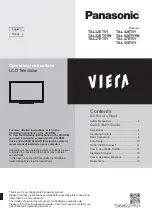
English
15
Viewing 3D images
You can enjoy viewing 3D images with contents or programmes corresponding to the 3D effect by wearing the 3D
Eyewear.
“Standard accessories” (p. 4)
This TV supports [Frame Sequential]
1
, [Side by Side]
2
and [Top and Bottom]
3
3D formats.
1: The 3D format that the images for the left and right eyes are recorded with the high definition quality and alternately
played back.
2,
3: Other available 3D formats
How to view the 3D images
(p. 16)
Warning
Do not disassemble or modify the 3D Eyewear. Doing so may result in injury, or may cause the user to feel unwell.
Caution
To use 3D Eyewear safely and comfortably, please read these instructions fully.
3D Eyewear
Do not drop, exert pressure on, or step on the 3D Eyewear. Doing so may damage the glass section, which may
result in injury.
Be careful of the tips of the frame and the hinge section when putting on the 3D Eyewear. Failure to heed this
warning may result in injury. Pay special attention when children are using this product.
Viewing 3D Content
Do not use the 3D Eyewear if you have a history of over-sensitivity to light, heart problems, or have any other existing
medical condition. Using the 3D Eyewear may cause the symptoms to worsen.
Stop using the 3D Eyewear immediately if you feel tired, discomfort, or any other abnormality. Continuing to use
the 3D Eyewear in such cases may cause you to feel unwell. Please take the necessary rest before continuing use.
When you set the effect by using [3D Adjustment], take into account that the vision of 3D images varies among
different individuals.
When using the 3D Eyewear, be careful not to strike the TV screen or other people by mistake. As the images are
in 3D, the distance between the user and screen may be mistaken, causing the user to strike the screen which may
result in injury.
When using the 3D Eyewear, make sure your eyes are on an approximately horizontal level, and keep a position
where you do not see double images.
If you suffer from myopia (short-sightedness), hyperopia (far-sightedness), astigmatism, or have eyesight differences
between the left and right eyes, please use corrective glasses or other such methods to correct your eyesight before
putting on the 3D Eyewear.
Stop using the 3D Eyewear if you can clearly see double images when viewing 3D content. Prolonged use may
cause eyesight fatigue.
View the screen at a distance at least 3 times further than the effective height of the screen.
Recommended distance:
TX-L32ET5Y / TX-L32ET5YW: 1.2 m or more
TX-L37ET5Y: 1.4 m or more
TX-L42ET5Y / TX-L42ET5YW: 1.6 m or more
TX-L47ET5Y: 1.8 m or more
TX-L55ET5Y: 2.1 m or more
Using the 3D Eyewear at a distance closer than the recommended distance may cause eyesight fatigue.
3D Eyewear Use
Do not use the 3D Eyewear for any other purpose except viewing 3D images.
As a guide, 3D Eyewear should not be used by children younger than 5 - 6 years old. As it is difficult to judge younger
children’s reactions to fatigue or discomfort, it may be difficult to prevent them from suddenly feeling unwell. When
this product is being used by a child, the parent or guardian should check to ensure that the child’s eyes are not
becoming tired.
Do not use if the 3D Eyewear is cracked or broken. Doing so may result in injury or eyesight fatigue.
Stop using the 3D Eyewear immediately if your skin feels unusual. In rare cases, the paint or materials used in the 3D
Eyewear may cause an allergic reaction.
Note
3D Eyewear can be worn over vision correction glasses.






























